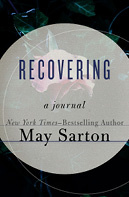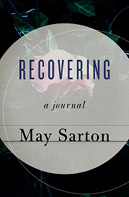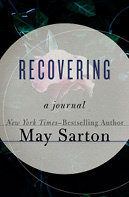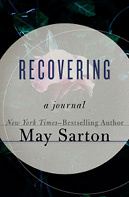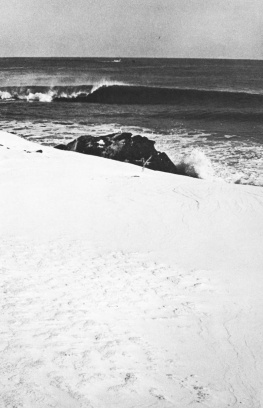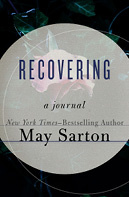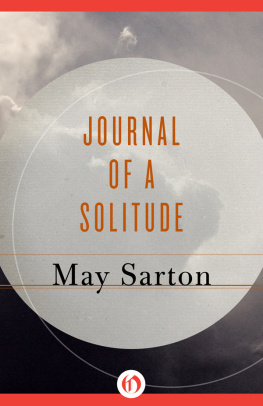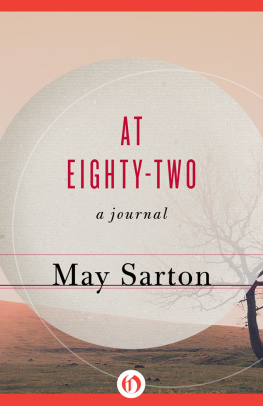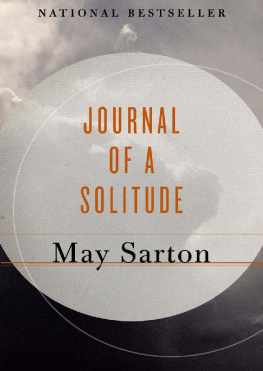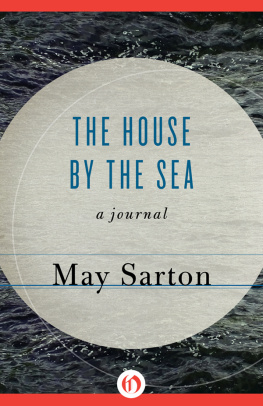At Seventy
A Journal
May Sarton

Monday, May 3rd, 1982
S UCH A PEACEFUL , windless morning here for my seventieth birthdaythe sea is pale blue, and although the field is still brown, it is dotted with daffodils at last. It has seemed an endless winter. But now at night the peepers are in full fettle, peeping away. And I was awakened by the cardinal, who is back again with his two wives, and the raucous cries of the male pheasant. I lay there, breathing in spring, listening to the faint susurration of the waves and awfully glad to be alive.
The table is set downstairs, all blue and white, with a tiny bunch of miniature daffodils, blue starflowers, and, glory be, two fritillaries. They always seem unreal with their purple-and-white-checkered bells, and I have never succeeded with a real show of them.
Then at each corner of the square table I have put a miniature rose, two white and two pale yellow, part of a bounty of miniature roses that have come for my birthday and will go along the terrace wall when the nights are not quite so cold. They are from Edythe Haddaway, one of the blessings of the last five years, for she comes when I am away to take care of Tamas and Bramble, feels at peace in this house, she tells me, and makes it peaceful for me to know that she is in residence and all is well at home when I am off on poetry-reading trips.
What is it like to be seventy? If someone else had lived so long and could remember things sixty years ago with great clarity, she would seem very old to me. But I do not feel old at all, not as much a survivor as a person still on her way. I suppose real old age begins when one looks backward rather than forward, but I look forward with joy to the years ahead and especially to the surprises that any day may bring.
In the middle of the night things well up from the past that are not always cause for rejoicingthe unsolved, the painful encounters, the mistakes, the reasons for shame or woe. But all, good or bad, painful or delightful, weave themselves into a rich tapestry, and all give me food for thought, food to grow on.
I am just back from a month of poetry readings, in and out through all of April. At Hartford College in Connecticut I had been asked to talk about old ageThe View From Here, I called the readingin a series on The Seasons of Womanhood. In the course of it I said, This is the best time of my life. I love being old. At that point a voice from the audience asked loudly, Why is it good to be old? I answered spontaneously and a little on the defensive, for I sensed incredulity in the questioner, Because I am more myself than I have ever been. There is less conflict. I am happier, more balanced, and (I heard myself say rather aggressively) more powerful. I felt it was rather an odd word, powerful, but I think it is true. It might have been more accurate to say I am better able to use my powers. I am surer of what my life is all about, have less self-doubt to conquer, although it has to be admitted that I wrote my new novel Anger in an agony of self-doubt most of the year, the hardest subject I have attempted to deal with in a novel since Mrs. Stevens Hears the Mermaids Singing. There I was breaking new ground, giving myself away. I was fifty-three and I deliberately made Mrs. Stevens seventy, and now here I am at what then seemed eons away, safely old.
I have always longed to be old, and that is because all my life I have had such great exemplars of old age, such marvelous models to contemplate. First of all, of course, was Marie Closset (her pen name, Jean Dominique), whom I celebrated in my first novel and with whom I exchanged lives through letters and meetings from my twenty-fifth year until her death. I turn to her bound volumes of poetry this minute and open to the line
Au silence lger des nuits prs de la mer
but I am bound to look for and find the long lyric addressed to Poetry, and as I write it here, I hear very clearly her light, grave voice, and we are sitting in her study, side by side:
Posie! Je tai porte mes lvres
Comme un caillou frais pour ma soif,
Je tai garde dans ma bouche obscure et sche
Comme une petite pierre quon remasse
Et que Ion mche avec du sang sur les lvres!
Posie, ah! je tai donn lAmour,
LAmour avec sa face comme une aube dargent
Sur la mer,et mon me, avec la mer dedans,
Et la tempte avec le ciel du petit jour
Livide et frais comme un coquillage luisant.
How happy Jean-Do would be to know that at seventy I live by the sea, and all those images are newly minted for me today like a cool pebble for my thirst, and my soul with the sea in it, and the tempest at dawn, pale and fresh as a shining shell. (But where is the music in English?)
Then Lugn-Po, my father in the theater, was a constant challenger and giver of courage during the theater years. I see his immense devouring smile and remember my pet name for him, mon lphant. So he always signed his letters with an elephant head and a long trunk waving triumphantly at the end of a page.
Basil de Selincourt, my father in poetry, fierce as a hawk (and he looked rather like a hawk), wrote the first really good review I ever had (in the London Observer on Encounter in April, my first book of poems) and that was before we became friends. He taught me many things, not least how to garden into very old age by working at an extremely slow tempobut I never did really learn it. That is still to come when, like Basil, I hope to put in a vegetable garden in my late eighties.
Then there is Eva Le Gallienne, who was only thirty when I first knew her as the star and creator of the Civic Repertory Theatre, and who has again triumphed in her eighties and shown a whole new generation what great acting is. She is proof that one can be eighty-three and still young. She too is a great gardener, so perhaps a good old age has to do with being still a friend of the earth.
I think also of Camille Mayran, who has written a magnificent book in her nineties, Portrait de Ma Mre en Son Grand ge. She tells me that now, well over ninety, she sees no change in herself except for a slight slowing down. She is all soul and mind, not a gardener at all! So one cannot generalize. But Eleanor Blair has just telephoned to wish me a happy birthday, as I write, and she says her garden is flourishing. Her voice sounded so young on the phone!
Perhaps the answer is not detachment as I used to believe but rather to be deeply involved in something, is to be attached. I am attached in a thousand waysand one of them compels me now to leave this airy room high up in the house to go down and get ready for my guests.
Tuesday, May 4th
F OR BREAKFAST at five I had a fresh egg from Anne and Barbaras chickens, a piece of homemade bread Donna brought last night with strawberry jam she had made, and I felt extraordinarily blessed by all that happened yesterday as I started to read a big manuscript on fathers and daughters that I promised to say something about. The price of being attached in a thousand ways is that there is never even twenty-four hours free of pressure, but this year I am clear in my mind that just this is what my life is all about, and what I have to learn (so late!) is to accept the multiple demands and understand that a rich life is bought at a high price in energy. If I can be wiser about not feeling so compulsive about everything, all will be well. Today, whatever happens, I am going out into the garden in the afternoon to plant the white impatiens Anne has been growing for me under lights, and the felicia, a charming blue flower I dearly love, and clean up the flower beds behind the house. Janice was hit in one eye by a bug when we walked down to the ocean yesterdayshe, Anne, Barbara, Tamas and Bramble, and Iso I am going to take her some lunch. What a miserable bug that was!
Next page
